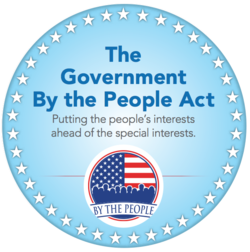Every Voice
This article is outside of Ballotpedia's coverage scope and does not receive scheduled updates. If you would like to help our coverage scope grow, consider donating to Ballotpedia.
| Every Voice | |
 | |
| Basic facts | |
| Location: | Washington, D.C. |
| Type: | 501(c)(4) |
| Affiliation: | Nonpartisan |
| Top official: | David Donnelly |
| Founder(s): | Nick Nyhart |
| Website: | Official website |
| Promoted policies | |
| Campaign finance regulation | |
| Budget | |
| 2013: | $1,547,909 |
| 2012: | $629,694 |
| 2011: | $276,714 |
| 2010: | $2,305,723 |
As of 2016, Every Voice, previously known as Public Campaign Action Fund, was a 501(c)(4) nonprofit organization located in Washington, D.C. The organization partners with Every Voice Center, a 501(c)(3), to promote citizen participation in politics.[1] Every Voice also had a super PAC—Every Voice Action Fund. The organization has believed that in America "every voice should be heard."[2]
Mission
The mission of Every Voice was split into three statements:[3]
| “ |
|
” |
These three key elements work toward the organization's larger goal of creating a government "that is truly of, by and for the people."[3]
History
The Public Campaign Action Fund, Every Voice's predecessor, was founded in 1997 to "fight for comprehensive overhaul of the nation’s campaign finance laws and to make opposing reform a political liability for elected officials."[5]
In 2014, the Public Campaign Action Fund, a 501(c)(4), merged with its affiliated super PAC—Friends of Democracy—to form Every Voice, a 501(c)(4). As President and CEO David Donnelly pointed out, the transition enabled the organization to shift from "the debate of money in politics" to "the debate on solutions."[6] The organization also created Every Voice Action Fund, a super PAC, in 2014. Every Voice enacted new plans to advocate for legislation matching small donor contributions with public funds.[6]
When discussing the organization's ideology, OpenSecrets.org referred to Every Voice and its affiliated 501(c)(3), Every Voice Center, as liberal.[7]
Work
Every Voice's work has focused on eliminating the emphasis of money in politics and encouraging civic participation in government. The organization's website provided two "solutions" to reform the political system: the Government by the People Act and the Fair Elections Now Act. Every Voice utilized its partnership with Every Voice Center, a 501(c)(3), to promote these bills. As a 501(c)(3), Every Voice Center has served to educate the public on the bills and collect tax-deductible financial support. In addition to lobbying for the passage of these laws, Every Voice has campaigned for political candidates that encourage campaign finance reform and the regulation of special interest money. The organization claimed the Government by the People Act and the Fair Elections Now Act will encourage democracy because they "empower ordinary Americans, increase political participation and reduce the emphasis of big donors."[3]
Government by the People Act
This House bill, HR 20, has several provisions to reverse the effects of the Supreme Court's ruling in Citizens United. Some of the larger provisions of HR 20 are listed below:[8]
- establishment of the Freedom From Influence Fund in the Treasury and of a Government by the People Oversight Commission in the FEC
- availability of enhanced support for candidates 60 days before the date of the election
- provision of a refundable $25 My Voice Tax Credit for donors
Demos, a 501(c)(3) supporter of the bill, stated on its website: "The Government By the People Act increases the power of the small contributions that ordinary citizens can afford to give, providing incentives for congressional candidates to reach out to average constituents."[9] The Washington Post, another supporter of the bill, released this commentary: "The Government by the People Act would help build a politics and a government that answer to the people."[10] HR 20 has been proposed in the 113th Congress and 114th Congress. On January 21, 2015, the bill was introduced in the House of Representatives to the 114th Congress. Two days later, the measure was referred to the Subcommittee on Communications and Technology.[8]
Fair Elections Now Act
Sponsor Senator Durbin (D-Ill.) on the bill
|
The goals of the Fair Elections Now Act were to provide an incentive for candidates to go after small donor contributions and to encourage voters to donate to candidates. The bill had several provisions to "amplify the voices of everyday Americans."[3] For the primary election, a candidate would receive a grant, based on the population of his or her state. In order for a candidate to run for office, he or she must raise a minimum dollar amount from a minimum number of small-dollar contributions from in-state donors. This bill would provide 6 to 1 matching funds for each of these contributions until the candidate reaches the matching cap. Once the candidate meets this standard, he or she can raise an unlimited amount of $150 contributions (each donor can only give $150 to a candidate per election). For the general election, the candidate would receive another grant, but he or she would bypass the matching funds. Like the Government by the People Act, this bill also establishes refundable $25 My Voice Tax Credit for donors.[3]
Organizations that supported this legislation included Every Voice, League of Conservation Voters, Brennan Center for Justice, National Organization for Women, U.S. PIRG, American Federation of State, County and Municipal Employees, Service Employees International Union, Common Cause, Public Citizen, NAACP, Consumer Watchdog and Democracy 21. Opponents included the following organizations: Cato Institute, Heritage Foundation, Institute for Free Speech and the Institute for Justice.[11]
This bill has been introduced in the 110th Congress (SB 936, HR 7022 and SB 1285), 111th Congress (SB 752 and HR 6116), 112th Congress (SB 750 and HR 1404), 113th Congress (SB 2023 and HR 269) and 114th Congress (SB 1538). On June 10, 2015, the Fair Elections Now Act was introduced in the Senate by sponsor Senator Durbin (D-Ill.).[12] As of August 2015, no further action has been taken on this measure.
Political activity
Ballot measure activity
Overview of ballot measure support and opposition
The following table details Every Voice’s ballot measure stances available on Ballotpedia:
| Ballot measure support and opposition for Every Voice | |||
|---|---|---|---|
| Ballot measure | Year | Position | Status |
| Washington State-Provided Campaign Financing Funded by a Non-Resident Sales Tax, Initiative 1464 | 2016 | Supported[13] | |
| Maine "Clean Elections" Initiative, Question 1 | 2015 | Supported[14] | |
| City of Seattle Restrictions on Campaign Finance and Elections, Initiative Measure No. 122 | 2015 | Supported[15] | |
Leadership
As of September 2016, the president and CEO of Every Voice was David Donnelly. Listed below is the organization's Board of Directors in 2016:[16]
- Becky Glass (President/Secretary)
- Lisa Prosienski (Treasurer)
- Richard Kirsch
- Pete MacDowell
- Greg Moore
Finances
The revenue and expenses for Every Voice, previously known as Public Campaign Action Fund, are listed below:
| Annual revenue and expenses for Every Voice, 2010-2012 | ||
|---|---|---|
| Tax Year | Total Revenue | Total Expenses |
| 2014[17] | $3,751,012 | $3,609,688 |
| 2013[18] | $1,547,909 | $1,552,451 |
| 2012[19] | $629,694 | $659,600 |
| 2011[20] | $276,714 | $468,538 |
| 2010[21] | $2,305,723 | $2,105,100 |
Every Voice's major donors since 2011 include the following individuals, labor unions and foundations: National Education Association, Communications Workers of America, Sean Eldridge, Sierra Club, United Food and Commercial Workers Union, the Piper Fund and Anne Bartley.[22]
Recent news
The link below is to the most recent stories in a Google news search for the terms Every Voice Campaign Finance. These results are automatically generated from Google. Ballotpedia does not curate or endorse these articles.
See also
- 501(c)(4)
- Every Voice Center
External links
Footnotes
- ↑ Every Voice Center, "About," accessed July 14, 2015
- ↑ Every Voice, "Home," accessed July 21, 2015
- ↑ 3.0 3.1 3.2 3.3 3.4 Every Voice, "Solutions," accessed July 20, 2015 Cite error: Invalid
<ref>tag; name "solution" defined multiple times with different content - ↑ Note: This text is quoted verbatim from the original source. Any inconsistencies are attributable to the original source.
- ↑ Public Campaign Action Fund, "About Us," accessed July 21, 2015
- ↑ 6.0 6.1 Huffington Post, "Campaign Finance Reform," accessed July 21, 2015
- ↑ Open Secrets, "Democratic/Liberal," accessed July 21, 2015
- ↑ 8.0 8.1 Library of Congress, "H.R.20 - Government By the People Act of 2015," accessed July 17, 2015
- ↑ Demos, "The Government by the People Act," accessed July 15, 2015
- ↑ The Washington Post, "Reversing the grievous error of Citizens United," accessed July 15, 2015
- ↑ OpenCongress, "H.R. 1826 - Fair Elections Now Act," accessed July 16, 2015
- ↑ The Library of Congress, "S.1538 - Fair Elections Now Act," accessed July 17, 2015
- ↑ Washington Public Disclosure Commission,"Integrity WA," accessed August 28, 2016
- ↑ Mainers for Accountable Elections, "Homepage," accessed July 14, 2015
- ↑ Honest Elections Seattle, "Home," accessed October 5, 2015
- ↑ Every Voice, "About Us," accessed September 15, 2016
- ↑ Every Voice, "Every Voice IRS Form 990 (2014)," accessed September 15, 2016
- ↑ Guidestar, "IRS Form 990 2013," accessed July 17, 2015
- ↑ Every Voice, "PCAF 990 2012 Public Disclose," accessed July 17, 2015
- ↑ Every Voice, "PCAF 990 2011 Public Disclose," accessed July 17, 2015
- ↑ Every Voice, "PCAF 990 2010 Public Disclose," accessed July 17, 2015
- ↑ Every Voice, "Financials," accessed July 17, 2015
| |||||||




